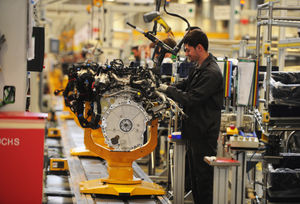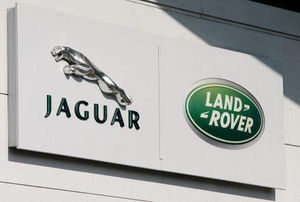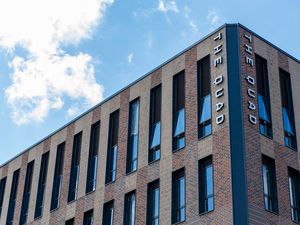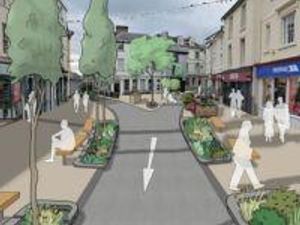Jaguar Land Rover jobs 'safe' in West Midlands despite new all-electric plans
Jaguar Land Rover workers across the West Midlands have been told their jobs are secure for now - despite the company announcing plans to become all-electric by 2025.
JLR announced its intention to phase out diesel engines and simplify its business on Monday - casting doubt over the future of its factories across the region, including the giant engine manufacturing centre next to the M54 north of Wolverhampton.
However the luxury car maker said there would be no compulsory job losses, with its UK sites set to be adapted to accommodate the new electric models.
JLR employs around 40,000 people across the UK, including more than 1,000 at the i54 in Wolverhampton where it makes petrol and diesel engines.
Diesel engines are now set to be phased out by 2026 as the company invests £2.5 billion a year developing electric technology. Details of what this means for the i54 plant have not yet been confirmed by JLR.
Announcing the "Reimagine Strategy", JLR chief executive Thierry Bolloré said the brand would retain all its "core plants" for the new electric models.

Mr Bollore, who succeeded Sir Ralf Speth in September, said the ambition was to "become the creator of the world's most desirable luxury vehicles" and stressed that all car plants and assembly facilities around the world would be retained.
The plant at Solihull, which is the company's biggest with around 10,000 staff, will be home to future advances in Jaguars.
However the future of the Castle Bromwich plant was less certain.
The plant, which currently produces the XE and XF saloons, and F-Type sports car, is set to continue production with current models – all of which have been unconfirmed for a next-generation – until the nameplates reach the end of their lifecycle, likely until at least 2024.
An electric XJ was set to be produced there as early as this year, however, the firm looks to have scrapped the plans.
However, while the plant is not expected to close, Bolloré did not confirm what the factory would do in the future, but just that Jaguar would “explore plans to repurpose the plant”.
The former Spitfire factory will continue production of existing models until the end of their life cycle before JLR explores opportunities to repurpose the plant.
Cautious welcome from union
Union Unite broadly welcomed the announcement, deeming it good news in challenging economic times.
Unite national officer for the automotive industries Des Quinn said: “Unite understands the need for a re-evaluation of the direction of travel for the Jaguar Land Rover brands and the challenges facing the business given the events of recent years.
“These pressures included the slump in global automotive sales; the fallout of ‘Dieselgate’ and tighter regulation around emissions which have been compounded by lack of confidence due to the Brexit process and the effects of the worldwide pandemic.
“For those reasons, we welcome the Reimagine programme and the vision for the company in the future.

“However, this is not unconditional support. Assurances of no plant closures and no compulsory job losses have been sought and given, and it is on this basis only that we will work with the company to meet the challenges of the future.
“A green and clean future for the JLR and the planet is ‘a must’ so sustainability will be key in everything we do, including world class product development and generating manufacturing employment.
“The Reimagine strategy lays the foundation for an electric future, and the investment and advent of new technology are good news in challenging economic times.”
All-electric Land Rover
The new strategy also involves a dramatic reduction in layers of management within the business and moving more teams to its Gaydon base in Warwickshire, where Mr Bollore is based.
The carmaker will also share more technology and knowledge with its parent company, Tata Motors, in an effort to reduce costs.
The first all-electric Land Rover model is expected in 2024, with all Jaguar and Land Rover models planned to be available in pure electric form by the end of the decade.
As the hydrogen economy accelerates JLR will also be adopting clean hydrogen fuel cell technology and will begin testing prototypes on UK roads this year, with JLR planning to be a a net zero carbon business by 2039 across its supply chain.
Jaguar Land Rover has been a wholly-owned subsidiary of Tata Motors, in which Tata Sons is the largest shareholder, since 2008.

Mr Bollore said: "In the last 12 months we have faced the economic impact of Covid and the headwinds of accelerated change for the industry and Brexit."
He stressed that JLR was unique in the global automotive industry as designers of peerless models, an unrivalled understanding of the future luxury needs of its customers, emotionally rich brand equity, a spirit of Britishness and unrivalled access to leading global players in technology and sustainability within the wider Tata Group.
“We are harnessing those ingredients today to reimagine the business, the two brands and the customer experience of tomorrow. The Reimagine strategy allows us to enhance and celebrate that uniqueness like never before. Together, we can design an even more sustainable and positive impact on the world around us,” said Mr Bolloré.
“We have so many ingredients from within. It is a unique opportunity
“Others have to rely solely on external partnerships and compromise, but we have frictionless access that will allow us to lean forward with confidence and at speed.”
Natarajan Chandrasekaran, chairman of Tata Sons, added: “The Reimagine strategy takes Jaguar Land Rover on a significant path of acceleration in harmony with the vision and sustainability priorities of the wider Tata Group.
"Together, we will help Jaguar realise its potential, reinforce Land Rover’s timeless appeal and collectively become a symbol of a truly responsible business for its customers, society and the planet.”




